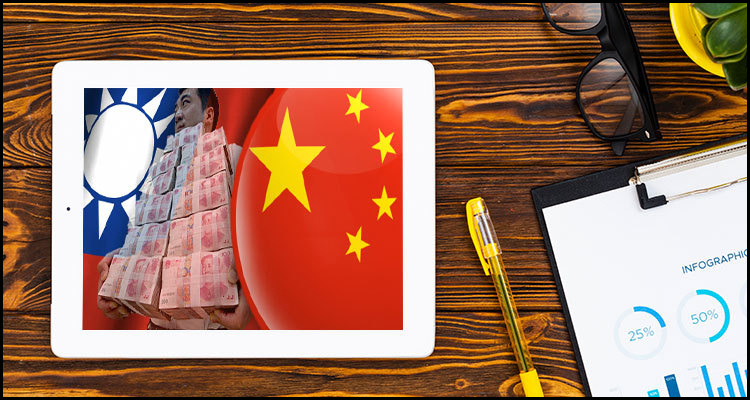Law enforcement officials in Taiwan have reportedly shut down an illegal gambling operation that is believed to have allowed local gamblers to transfer well over $462.7 million between the island nation and China.
According to a Friday report from the Taipei Times newspaper, the Chiayi District Prosecutors Office coordinated raids in 72 localities including the cities of Taipei, Kaohsiung, Taoyuan and Taichung last week that led to some 100 people being issued with subpoenas to appear in court.
Election examination:
The newspaper reported that the Wednesday action was part of an ongoing investigation into unlawful betting activities surrounding Taiwan’s upcoming presidential elections and also resulted in the seizure of some 67 desktop and laptop computers as well as local and foreign currencies worth approximately $213,300.
Booked boss:
The Taipei Times reported that a 50-year-old man with the surname of ‘Hsiao’ is believed to have been behind the alleged criminal scheme run out of the southern city of Chiayi with assistance from a quadragenarian business partner known only as ‘Lai.’ While the suspected mastermind was purportedly arrested following the raids, his younger accomplice is thought to have fled to the Philippines where the illicit enterprise had established a satellite office.
Disagreeable distinction:
Tsai Ying-Chun from the Chiayi District Prosecutors Office reportedly told the newspaper that the raids had unearthed what is thought to have been the largest-known underground bank for foreign remittances in Taiwan and moreover led to the seizure of around 200 mobile telephones alongside USB drives, six luxury automobiles and 16 diamonds valued at in excess of $200,000.
Spread appeal:
The source reported that the illegal betting operation  was allowing punters to place bets on the January 11 presidential elections that will see voters choose between center-left Democratic Progressive Party incumbent Tsai Ing-Wen (pictured) and challenger Han Kuo-Yu from the unification-friendly Chinese Nationalist Party. Although the sitting President is being heavily tipped to retain her position, the newspaper explained that the illicit enterprise utilizing cash from China was furthermore offering locals the chance to wager against a spread that ranged from 700,000 to one million votes.
was allowing punters to place bets on the January 11 presidential elections that will see voters choose between center-left Democratic Progressive Party incumbent Tsai Ing-Wen (pictured) and challenger Han Kuo-Yu from the unification-friendly Chinese Nationalist Party. Although the sitting President is being heavily tipped to retain her position, the newspaper explained that the illicit enterprise utilizing cash from China was furthermore offering locals the chance to wager against a spread that ranged from 700,000 to one million votes.
The newspaper detailed that the potential to earn high returns by beating this spread may encourage people to vote for Han and is thought to have been behind the 62-year-old’s unexpected victory over former Democratic Progressive Party legislator Chen Chi-Mai in the 2018 mayoral elections for the city of Kaohsiung.
Critical consequences:
Last week’s raids followed an August action conducted against a suspected sister scheme that was believed to have processed similar wagers worth around $264.9 million. The newspaper additionally reported that ‘Hsiao’ is thought to have been the ‘big boss’ behind of both betting enterprises with the alleged architect and 20 accomplices now facing charges related to breaches of the Money Laundering Control Act, the Banking Act and the Criminal Code.
Chinese campaign:
In related news and the online news domain at  CalvinAyre.com used a Thursday report to detail that China’s Public Security Ministry has teamed up with local technology firm Tencent Holdings Limited to launch their No Gambling Month campaign. This effort will purportedly encourage people in the planet’s most populated nation to educate themselves about the dangers of gambling, report any instances of suspected illegal betting and refrain from placing wagers throughout January.
CalvinAyre.com used a Thursday report to detail that China’s Public Security Ministry has teamed up with local technology firm Tencent Holdings Limited to launch their No Gambling Month campaign. This effort will purportedly encourage people in the planet’s most populated nation to educate themselves about the dangers of gambling, report any instances of suspected illegal betting and refrain from placing wagers throughout January.
Successful solution:
CalvinAyre.com reported that Tencent Holdings Limited announced that it intends to use its Guardian computer program throughout the month-long drive to reduce ‘the harm caused to the Internet’ by those who operate gambling, pyramid and cyber fraud schemes. The Shenzhen-headquartered firm purportedly also explained that its artificial intelligence innovation utilizes ‘gambling transaction recognition model’ algorithms to identify and block suspected gambling transactions and has led to some 110 investigations alongside over 3,700 arrests since being launched last January.



